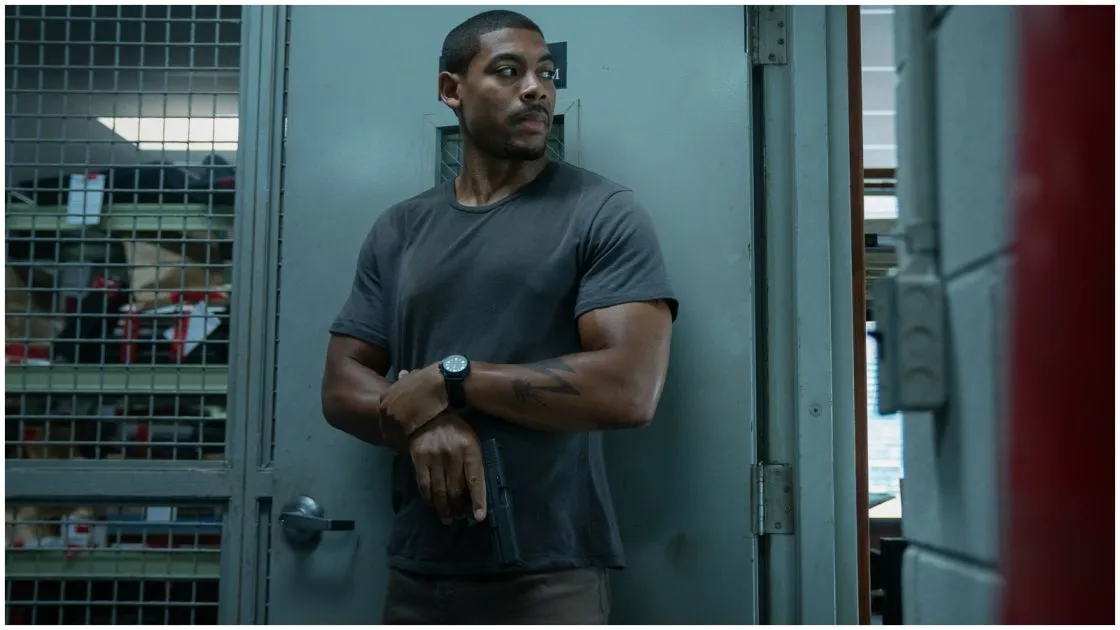Instead of completing his own three-color trilogy with Rebel Ridge ('Red Ridge' was right there), writer and director Jeremy Saulnier chooses to saddle this intriguing 21st century riff on First Blood with a prosaic title that does not do it honor. Blue Ruin and Green Room are two of Saulnier's other films. However, for Saulnier, it must be quite a relief just to get this Netflix project out the door. This is because the production of the 2020 film was delayed first by Covid and then by the unexpected departure of the original lead, John Boyega. Aaron Pierre, who shrugged into the skin of a former Marine and ardent biker who finds himself firmly at odds with a small-town police force, is a more than capable replacement, which is a source of great happiness.
Richmond, played by Pierre, is subjected to a search and seizure that is legal but ethically questionable. This occurs after he is rammed off his bike by a patrol car for cycling while Black in the town of Shelby Springs, Louisiana. The police take the 36 grand that he has scraped together in order to bail out his cousin and start a new life. Because he is understandably unwilling to simply walk away from the situation (something that the law appears to be set up to encourage), he seeks remedy first from the court, then from the local police chief (Don Johnson, who is wearing a shit-eating smile), only to find out that some types of corruption are afforded complete protection under the law. Richmond decides to delve a little more and find out exactly how far the rot in this town goes after finding some sympathy in Summer McBride, a court clerk who is similarly despondent. Summer McBride is played by AnnaSophia Robb, who was one of the younger versions of Carrie Bradshaw.

If the only thing you're looking for from Rebel Ridge is a cathartic story about a man who has been wronged beating the ever-loving shit out of a group of filthy cops, then the movie has you covered. In this specific instance, the sequence in which Emory Cohen's annoyingly pompous patrolman belatedly realizes exactly what Richmond did in the Marines is very delightful. As you might expect from a re-dressed Western, the stranger who strolls into town here is not a man who is without means. On the other hand, Saulnier's story of a single individual going up against the system turns out to be a more nuanced beast than its vigilante setup might imply. What begins as an obvious wink towards institutional racism gradually gives way to a very contemporary analysis of the myriad legal ways that American law enforcement might misuse their position, weaponising asset seizures and utilizing bureaucratic legal procedure as a shield against penalties.
That what the police are doing isn’t even unlawful (at least initially) makes the injustice here extra frustrating. This isn’t a case of a few bad apples, so much as the existence of an uncaring and unyielding judicial system that favors institutions at the expense of individual liberties. Police corruption, Saulnier maintains, is not only flourishing, but has become more sophisticated and considerably more subtle; calls to defund the police appear especially empty since there are multiple ways in which a dishonest department may quite capably sustain itself. You may also read this: Discuss Alien: Romulus Review with Fellow Fans

If that all seems pretty dull, then you’ll be delighted to know that Richmond’s answer to this non-criminal criminality is not to furiously bring about a class-action lawsuit, but rather, as you’d very much hope, to begin breaking bones and feeding people their teeth. When he eventually snaps, as we’re really anxious for him to do from about five minutes in, the pay-off is adequately rewarding. But even here, Saulnier opts not to follow the conventional road. Pierre, whose throaty growl will bring voice to Barry Jenkins’ Mufasa later this year, is a pressure cooker of barely restrained fury, clear eyes belying the danger that hides beneath his flawless manners and veneer of respect. But Richmond is no Rambo, and when he eventually lets his beast off the leash, the result isn’t the bodycount you might expect. “De-escalation” is a concept used constantly in Rebel Ridge, and Saulnier is determined to depart Richmond with the moral high ground, regardless the provocation.
None of which is to say the film lacks for action, and the set-pieces, while wisely placed, are wonderfully crafted and fresh-feeling, despite the old genre beats. Saulnier knows well how to squeeze tension out of a stand-off and each nervy confrontation positively thrums with it. That tension can only last so long, however, and the picture does lose momentum in the latter third. At comfortably over two hours, this could have used as much restraint in its runtime as in its application of violence — a probable consequence of Saulnier’s Swiss-Army-knife-style multitasking as writer, director, producer and editor. But despite some uneven pace and a somewhat predictable outcome, this is a rewarding, substantial genre piece that, despite its throwaway title, is definitely worth remembering.






.webp)

.jpg)


